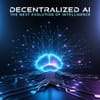Decentralized AI (dAI) represents a paradigm shift in artificial intelligence, where AI systems operate on blockchain technology and peer-to-peer networks. This approach challenges the traditional centralized model, where AI is controlled by a single entity.
Decentralized AI is characterized by its use of blockchain technology, which enables secure, transparent, and tamper-proof data management. This allows for the creation of autonomous AI systems that can operate independently, making decisions based on real-time data.
Decentralized AI offers several advantages over traditional centralized AI systems, including increased security, improved transparency, and enhanced autonomy. By leveraging blockchain technology, dAI systems can also ensure data integrity and prevent unauthorized access.
The potential applications of decentralized AI are vast, ranging from finance and healthcare to education and governance. For instance, dAI can be used to create autonomous financial systems, secure healthcare records, and develop personalized education platforms.
However, decentralized AI also presents several challenges and limitations, including scalability issues, regulatory uncertainty, and the need for further research and development. Despite these challenges, decentralized AI holds significant promise and has the potential to transform industries and revolutionize the way we think about intelligence.
As this technology continues to evolve, it will be exciting to see how it develops and what new opportunities and challenges arise. Decentralized AI represents a new frontier in artificial intelligence, one that prioritizes autonomy, security, and transparency.


